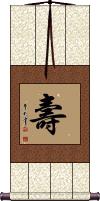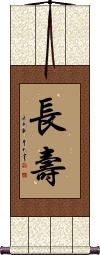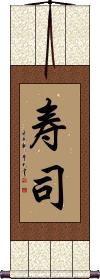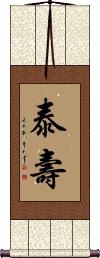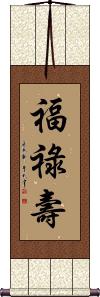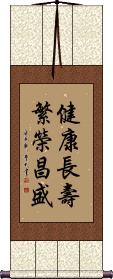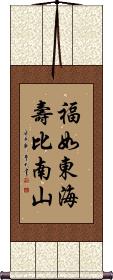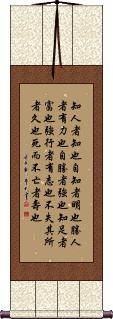Many custom options...
And formats...

壽 in Chinese / Japanese...
Buy an 壽 calligraphy wall scroll here!
Personalize your custom “壽” project by clicking the button next to your favorite “壽” title below...
Longevity / Long Life
Longevity / Long Life
Used as a noun, this word means “longevity” or “the ability to live long.”
It can also be an adjective meaning “long-lived.”
![]() Please note that Japanese use a simplified version of the second character of longevity - it also happens to be the same simplification used in mainland China. Click on the character to the right if you want the Japanese/Simplified version of this two-character longevity calligraphy.
Please note that Japanese use a simplified version of the second character of longevity - it also happens to be the same simplification used in mainland China. Click on the character to the right if you want the Japanese/Simplified version of this two-character longevity calligraphy.
Sushi
Got a 寿司/sushi restaurant and need an appropriate wall scroll? Or maybe you love sushi enough to have it on your wall. This sushi calligraphy scroll is for you.
Note that the written characters for sushi are the same in Chinese and Japanese. However, the first character is actually a modern Japanese / Simplified Chinese, so in some cases, it will be written differently in Taiwan, Hong Kong, and some older Japanese sushi restaurants where you might see 壽司 instead of 寿司.
Taishou / Yasutoshi
Fu Lu Shou
These are the short titles for Sanxing or 三星 (Three Stars).
福祿壽 are the gods of Jupiter, Ursa Major, and Sirius. Fu, Lu, and Shou represent fortune (福), presiding over the planet Jupiter, prosperity (祿), presiding over Ursa Major, and longevity (壽), presiding over Sirius.
In old Chinese folk religion, they are often represented as three old bearded wise men.
Forever Young / Long Life
Longevity / Long Life Wishes
南山之壽 is a wish for long life for someone. The first part of this Japanese phrase is “Nan Zan,” which means “south mountain.” This mountain is one of the good wishes, good fortune, and prosperity. The title is often used as a salutation of good wishes.
The third Kanji is just a connector, and the last Kanji means long life or longevity.
I guess you could translate this phrase as “May your life be as long as Nan Zan is tall.”
Live Long and Prosper
Longevity / Long Life Wishes
A wish for a long and prosperous life
福如東海壽比南山 is a phrase that means “May you have good fortune as great as the eastern oceans, and may your life last as long as the southern mountains.”
In ancient Chinese mythology, the eastern oceans and southern mountains are where God resides (basically it is the same as saying “heaven”). So it's like saying, “May your good fortune and life be as vast as the heavens.”
There is also a longer, 14-character version of this phrase. Also, this can be cut into two scrolls (with half the phrase on each side - great for hanging on either side of a doorway). Just let me know if you'd like a special version (there is an additional cost).
Daodejing / Tao Te Ching - Chapter 33
This is referred to as passage or chapter 33 of the Dao De Jing (often Romanized as “Tao Te Ching”).
These are the words of the philosopher Laozi (Lao Tzu).
To know others is wisdom;
To know oneself is acuity/intelligence.
To conquer others is power,
To conquer oneself is strength.
To know contentment is to have wealth.
To act resolutely is to have purpose.
To stay one's ground is to be enduring.
To die and yet not be forgotten is to be long-lived.
To understand others is to be knowledgeable;
To understand yourself is to be wise.
To conquer others is to have strength;
To conquer yourself is to be strong.
To know when you have enough is to be rich.
To go forward with strength is to have ambition.
To not lose your place is to be long-lasting.
To die but not be forgotten -- that's true long life.
He who is content is rich;
He who acts with persistence has will;
He who does not lose his roots will endure;
He who dies physically but preserves the Dao
will enjoy a long after-life.
Notes:
During our research, the Chinese characters shown here are probably the most accurate to the original text of Laozi. These were taken for the most part from the Mawangdui 1973 and Guodan 1993 manuscripts which pre-date other Daodejing texts by about 1000 years.
Grammar was a little different in Laozi’s time. So you should consider this to be the ancient Chinese version. Some have modernized this passage by adding, removing, or swapping articles and changing the grammar (we felt the oldest and most original version would be more desirable). You may find other versions printed in books or online - sometimes these modern texts are simply used to explain to Chinese people what the original text really means.
This language issue can be compared in English by thinking how the King James (known as the Authorized version in Great Britain) Bible from 1611 was written, and comparing it to modern English. Now imagine that the Daodejing was probably written around 403 BCE (2000 years before the King James Version of the Bible). To a Chinese person, the original Daodejing reads like text that is 3 times more detached compared to Shakespeare’s English is to our modern-day speech.
Extended notes:
While on this Biblical text comparison, it should be noted, that just like the Bible, all the original texts of the Daodejing were lost or destroyed long ago. Just as with the scripture used to create the Bible, various manuscripts exist, many with variations or copyist errors. Just as the earliest New Testament scripture (incomplete) is from 170 years after Christ, the earliest Daodejing manuscript (incomplete) is from 100-200 years after the death of Laozi.
The reason that the originals were lost probably has a lot to do with the first Qin Emperor. Upon taking power and unifying China, he ordered the burning and destruction of all books (scrolls/rolls) except those pertaining to Chinese medicine and a few other subjects. The surviving Daodejing manuscripts were either hidden on purpose or simply forgotten about. Some were not unearthed until as late as 1993.
We compared a lot of research by various archeologists and historians before deciding on this as the most accurate and correct version. But one must allow that it may not be perfect, or the actual and original as from the hand of Laozi himself.
Not the results for 壽 that you were looking for?
Below are some entries from our dictionary that may match your 壽 search...
| Characters If shown, 2nd row is Simp. Chinese |
Pronunciation Romanization |
Simple Dictionary Definition |
壽 寿 see styles |
shòu shou4 shou hisashi ひさし |
More info & calligraphy: Longevity / Long Life(out-dated kanji) (1) congratulations; felicitations; best wishes; (2) longevity; long life; (given name) Hisashi Long life, longevity, age, v. 耆婆 jīva. |
壽司 寿司 see styles |
shòu sī shou4 si1 shou ssu hisaji ひさじ |
sushi (personal name) Hisaji |
長壽 长寿 see styles |
cháng shòu chang2 shou4 ch`ang shou chang shou nagatoshi ながとし |
More info & calligraphy: Longevity / Long Life(personal name) Nagatoshi Long life. |
一壽 see styles |
kazuhisa かずひさ |
(personal name) Kazuhisa |
世壽 世寿 see styles |
shì shòu shi4 shou4 shih shou seju |
worldly age |
主壽 see styles |
keiju / keju けいじゅ |
(given name) Keiju |
仁壽 仁寿 see styles |
rén shòu ren2 shou4 jen shou |
Renshou County in Meishan 眉山市[Mei2 shan1 Shi4], Sichuan See: 仁寿 |
伯壽 see styles |
hakuju はくじゅ |
(personal name) Hakuju |
住壽 住寿 see styles |
zhù shòu zhu4 shou4 chu shou jū ju |
lives a long time |
佛壽 佛寿 see styles |
fó shòu fo2 shou4 fo shou butsu ju |
Buddha's life, or age. While he only lived to eighty as a man, in his saṁbhogakāya he is without end, eternal; cf. Lotus Sutra, 壽量品, where Buddha is declared to be eternal. |
作壽 作寿 see styles |
zuò shòu zuo4 shou4 tso shou |
variant of 做壽|做寿[zuo4 shou4] |
做壽 做寿 see styles |
zuò shòu zuo4 shou4 tso shou |
to celebrate a birthday (of an elderly person) |
健壽 see styles |
taketoshi たけとし |
(personal name) Taketoshi |
克壽 see styles |
katsuhisa かつひさ |
(personal name) Katsuhisa |
具壽 具寿 see styles |
jù shòu ju4 shou4 chü shou guju |
? āyuṣmant. Having long life, a term by which monk, a pupil or a youth may be addressed. |
南壽 see styles |
nanju なんじゅ |
(surname) Nanju |
善壽 see styles |
yoshiji よしじ |
(male given name) Yoshiji |
喜壽 喜寿 see styles |
xǐ shòu xi3 shou4 hsi shou |
77th birthday (honorific, archaic or Japanese term) See: 喜寿 |
嘉壽 see styles |
kanaga かなが |
(surname) Kanaga |
增壽 增寿 see styles |
zēng shòu zeng1 shou4 tseng shou zōju |
to prolong life |
壽々 see styles |
suzu すず |
(female given name) Suzu |
壽一 see styles |
hisakazu ひさかず |
(personal name) Hisakazu |
壽上 see styles |
toshigami としがみ |
(surname) Toshigami |
壽乃 see styles |
hisano ひさの |
(female given name) Hisano |
壽二 see styles |
toshitsugu としつぐ |
(given name) Toshitsugu |
壽人 see styles |
hisahito ひさひと |
(personal name) Hisahito |
壽代 see styles |
hisayo ひさよ |
(female given name) Hisayo |
壽作 see styles |
jusaku じゅさく |
(male given name) Jusaku |
壽俊 see styles |
hisatoshi ひさとし |
(male given name) Hisatoshi |
壽保 see styles |
hisayasu ひさやす |
(personal name) Hisayasu |
Click here for more 壽 results from our dictionary
The following table may be helpful for those studying Chinese or Japanese...
| Title | Characters | Romaji (Romanized Japanese) | Various forms of Romanized Chinese | |
| Longevity Long Life | 壽 寿 | ju / kotobuki | shòu / shou4 / shou | |
| Longevity Long Life | 長壽 长寿 | chouju / choju | cháng shòu chang2 shou4 chang shou changshou | ch`ang shou changshou chang shou |
| Sushi | 壽司 寿司 | su shi / sushi | shòu sī / shou4 si1 / shou si / shousi | shou ssu / shoussu |
| Taishou Yasutoshi | 泰壽 泰寿 | tài shòu tai4 shou4 tai shou taishou | t`ai tai |
|
| Fu Lu Shou | 福祿壽 | fú lù shòu fu2 lu4 shou4 fu lu shou fulushou | ||
| Forever Young Long Life | 不老長壽 不老長寿 | fu rou chou ju furouchouju fu ro cho ju | ||
| Longevity Long Life Wishes | 南山之壽 南山之寿 | nan zan no jyu nanzannojyu | ||
| Live Long and Prosper | 健康長壽繁榮昌盛 健康长寿繁荣昌盛 | Jiàn kāng cháng shòu fán róng chāng shèng Jian4 kang1 chang2 shou4 fan2 rong2 chang1 sheng4 Jian kang chang shou fan rong chang sheng | Chien k`ang ch`ang shou fan jung ch`ang sheng Chien kang chang shou fan jung chang sheng |
|
| Longevity Long Life Wishes | 福如東海壽比南山 福如东海寿比南山 | fú rú dōng hǎi shòu bǐ nán shān fu2 ru2 dong1 hai3 shou4 bi3 nan2 shan1 fu ru dong hai shou bi nan shan furudonghaishoubinanshan | fu ju tung hai shou pi nan shan fujutunghaishoupinanshan |
|
| Daodejing Tao Te Ching - Chapter 33 | 知人者知也自知者明也勝人者有力也自勝者強也知足者富也強行者有志也不失其所者久也死而不亡者壽也 知人者知也自知者明也胜人者有力也自胜者强也知足者富也强行者有志也不失其所者久也死而不亡者寿也 | zhī rén zhě zhī yě zì zhī zhě míng yě shèng rén zhě yǒu lì yě zì shèng zhě qiáng yě zhī zú zhě fù yě qiáng xíng zhě yǒu zhì yě bù zhī qí suǒ zhě jiǔ yě sǐ ér bù wáng zhě shòu yě zhi1 ren2 zhe3 zhi1 ye3 zi4 zhi1 zhe3 ming2 ye3 sheng4 ren2 zhe3 you3 li4 ye3 zi4 sheng4 zhe3 qiang2 ye3 zhi1 zu2 zhe3 fu4 ye3 qiang2 xing2 zhe3 you3 zhi4 ye3 bu4 zhi1 qi2 suo3 zhe3 jiu3 ye3 si3 er2 bu4 wang2 zhe3 shou4 ye3 zhi ren zhe zhi ye zi zhi zhe ming ye sheng ren zhe you li ye zi sheng zhe qiang ye zhi zu zhe fu ye qiang xing zhe you zhi ye bu zhi qi suo zhe jiu ye si er bu wang zhe shou ye | chih jen che chih yeh tzu chih che ming yeh sheng jen che yu li yeh tzu sheng che ch`iang yeh chih tsu che fu yeh ch`iang hsing che yu chih yeh pu chih ch`i so che chiu yeh ssu erh pu wang che shou yeh chih jen che chih yeh tzu chih che ming yeh sheng jen che yu li yeh tzu sheng che chiang yeh chih tsu che fu yeh chiang hsing che yu chih yeh pu chih chi so che chiu yeh ssu erh pu wang che shou yeh |
|
| In some entries above you will see that characters have different versions above and below a line. In these cases, the characters above the line are Traditional Chinese, while the ones below are Simplified Chinese. | ||||
Successful Chinese Character and Japanese Kanji calligraphy searches within the last few hours...
